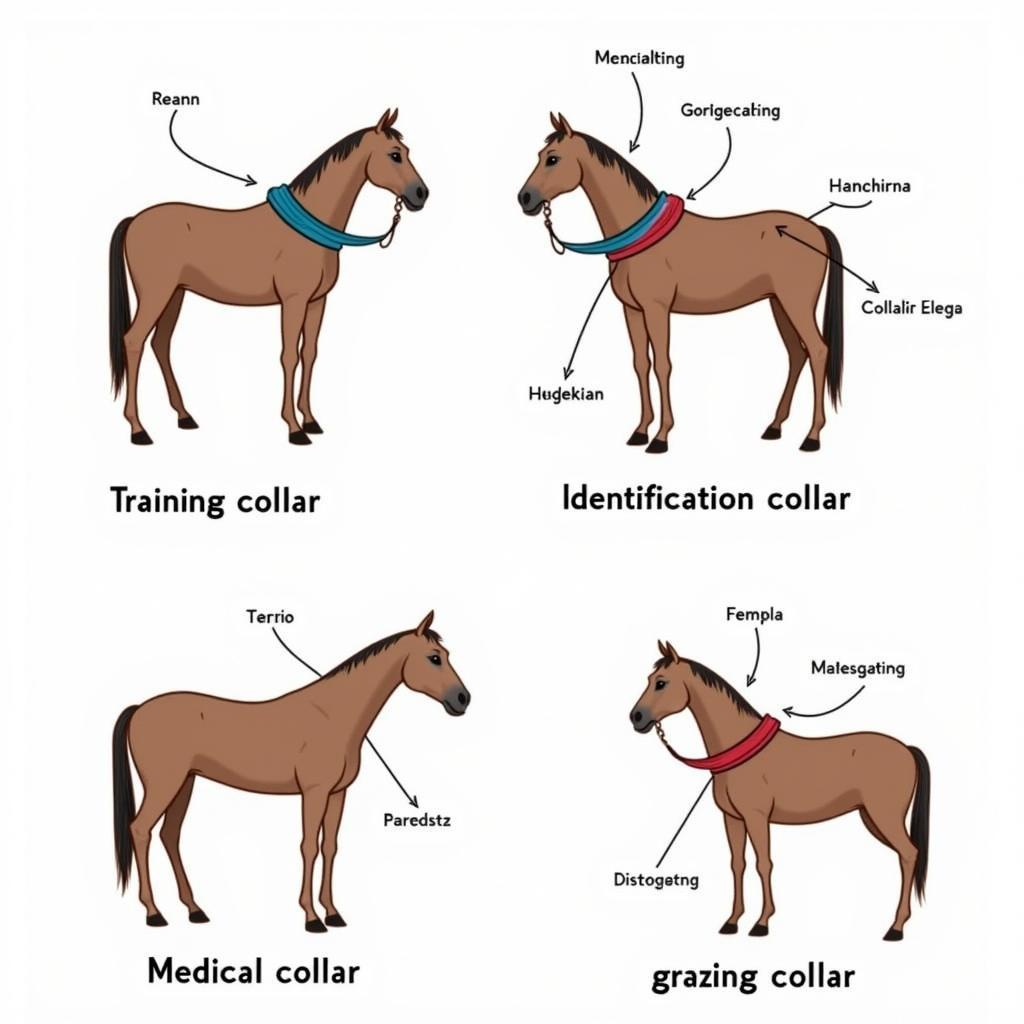Neck collars for horses are often misunderstood pieces of equipment. While not as common as bridles or halters, they serve specific purposes in various equestrian disciplines and horse management practices. This guide will delve into the different types of neck collars, their uses, and how to choose the right one for your horse.
Types of Horse Neck Collars
Several types of neck collars exist, each designed for a particular function. Understanding these distinctions is crucial for selecting the appropriate collar. Some common types include:
- Training Collars: These collars, sometimes called pressure collars, are used in certain training methods to encourage specific head and neck positions. They apply pressure to the horse’s neck when they resist the desired movement, releasing the pressure when they comply. It’s essential to use these collars with caution and under the guidance of an experienced trainer to avoid causing discomfort or injury.
- Identification Collars: Primarily used for easy identification, these collars typically feature a plate or tag with the horse’s name, owner’s information, or other relevant details. They can be especially useful in large herds or during emergencies.
- Medical Collars: These collars, such as horse neck cradle, are used to restrict a horse’s movement after an injury or surgery, preventing them from aggravating the affected area. They are often padded for comfort and can be customized to fit the horse’s specific needs.
- Grazing Collars: These restrict a horse’s grazing habits, helping to manage weight or prevent overgrazing in certain areas. They allow the horse to graze comfortably but limit the amount of grass they can consume.
 Different Types of Horse Neck Collars
Different Types of Horse Neck Collars
Choosing the Right Neck Collar Horse
Selecting the correct neck collar is vital for both the horse’s well-being and the effectiveness of its intended purpose. Consider the following factors:
- Purpose: The primary reason for using a neck collar will dictate the appropriate type. Are you training, managing grazing, or providing post-injury support?
- Size and Fit: The collar must fit the horse correctly, neither too tight nor too loose. A poorly fitting collar can cause discomfort, rubbing, or even restrict breathing. A well-fitted leather horse collar is usually a good choice for many applications.
- Material: Neck collars are made from various materials, including leather, nylon, and neoprene. Consider the horse’s sensitivity, climate, and the intended use when choosing the material.
- Safety Features: Ensure the collar has break-away features if there’s a risk of the horse getting caught. This is especially crucial for grazing collars.
Common Misconceptions about Neck Collars
Many horse owners are hesitant to use neck collars due to misconceptions about their purpose and functionality. It’s important to dispel these myths and understand the proper application of these tools.
-
Myth: All neck collars are cruel or restrictive.
-
Fact: When used appropriately and fitted correctly, neck collars can be beneficial for training, management, or medical purposes. Just like a poorly fitting throat latch on horse, a badly fitted collar can cause issues.
-
Myth: Neck collars are a replacement for proper training.
-
Fact: Collars are tools to aid training and should never replace consistent, positive reinforcement methods. Understanding horse stable vices can be as important as understanding how to use a collar correctly.
When to Consult a Professional
While many neck collars can be used safely and effectively by informed horse owners, certain situations warrant professional guidance. Consult a veterinarian or experienced equine professional if:
- You’re unsure which type of collar is appropriate for your horse’s needs.
- Your horse exhibits any signs of discomfort or injury related to the collar.
- You’re considering using a training collar and need guidance on proper techniques.
In conclusion, the Neck Collar Horse is a versatile piece of equipment with various applications. By understanding the different types, choosing the right fit, and using them responsibly, horse owners can utilize these collars effectively for training, management, and medical purposes.
While this article focuses on practical neck collars, you might also be interested in the more whimsical side of horse accessories, such as a horse hippie costume.
FAQ
- Are neck collars harmful to horses? No, when used correctly and fitted properly, they are safe.
- Can I use a training collar on my own? It’s recommended to work with a qualified trainer.
- What material is best for a neck collar? It depends on the intended use; leather, nylon, and neoprene are common choices.
- How tight should a neck collar be? Snug but not restrictive; you should be able to fit two fingers between the collar and the horse’s neck.
- Can I leave a grazing collar on all the time? Follow the manufacturer’s recommendations and monitor your horse closely.
- Where can I buy a neck collar horse? Equine supply stores and online retailers.
- What are the benefits of using an identification collar? Easy identification in emergencies or large herds.
Need further assistance? Contact us: Phone: 0772127271, Email: [email protected] or visit us at QGM2+WX2, Vị Trung, Vị Thuỷ, Hậu Giang, Việt Nam. We have a 24/7 customer service team.